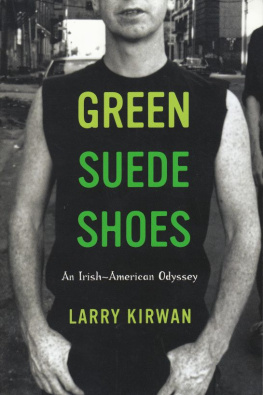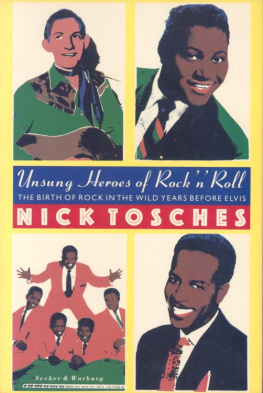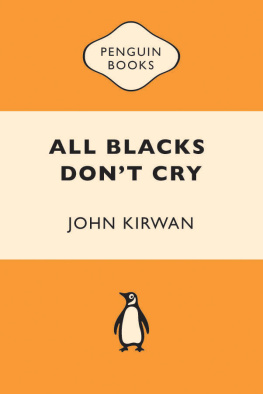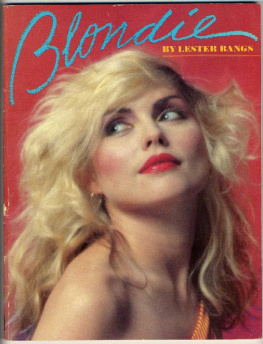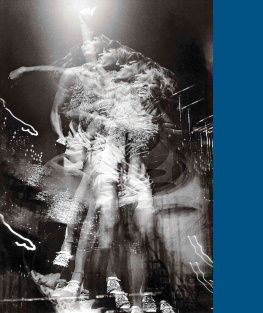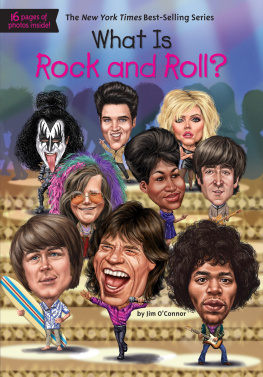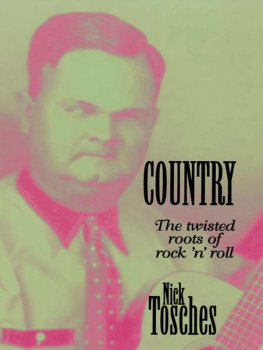Green Suede Shoes
An Irish-American Odyssey
by
Larry Kirwan
Copyright 2013 Larry Kirwan
Smashwords Edition
Praise for Green Suede Shoes AnIrish-American Odyssey
In the great tradition of Irish narratives,Larry Kirwan now occupies a noble and unique place. His story is sorich, layered, and edgy without a trace of self-consciousness orself-pity. This is a truly compelling story, told by a rock androll poet with a deep appreciation of his roots. His understandingof himself and his connection to his past informs his current workin the most exquisite way.
- Rosanne Cash, singer and writer
Lyrical from the first word to the last
A bible for the Irish emigrant
A book about emigrating that takes you backhome
A pure voice for the Irish-American
- Eoin Colfer, author of the ArtemisFowl series
American needs to listen to Larry Kirwan, andadjust. He embodies the new Irish working-class immigrant whorefuses to throw his heritage away but sings and oh my, he canwrite too the stories of a throbbing, multicultural future.
- Tom Hayden, activist and author of Irishon the Inside
Chapter One: Lifes Like That, IsntIt?
The boy is holding his Mothers hand
In a seaside station
The streets are silent in the rain
Naked and dead in their small town pain
When the train pulls in, a man alights,
Lugging a suitcase, battered but bright
With labels from the Argentines,
He pulls down his hat, flexes his knees
Swaggers up the platform, Bogart on ice
Winks at the boy, kisses his wife
For a moment theyre lost in their ardor
The boy is suddenly jealous of hisFather.
The young couple walk hand in hand up thetown,
The boy just keeps his head down
Past the furniture store
Owned by a comrade from the Spanish CivilWar
Looks in the window, to his surprise,
An apparition in maple catches his eye.
A Loyalist guitar from the Siege ofMadrid,
He presses his nose up to the windowsill
His Father says, Como estas, Senor?
The boy is entranced by your guitar
Heres a couple of quid down,
Youll get the rest next Saturday
Lifes like that, isnt it?
Back in the house his parents disappear,
To the bedroom they go, but all the boy canhear
Are the strings echoing off the maple,
His Father shouts out, Hey son, soon youllbe able
To play me a tango, knock spots off thesound,
Then he grabs his wife, twirls heraround.
The boy watches in wonder as the couplecavort,
Outside the rain and thunder drown out
The chill of the devotional bell,
While inside their small kitchen the fatherand mother
Are sublimely going to hell.
The boy is religious, serves mass at theFriary,
Hes got a crush on St. Anthony
Got a hot date with him when he gets toheaven,
But its still hard to get up at twenty toseven
On a gale force morning, slates hitting thestreets
Exploding in smithereens all around him.
He runs in fear past the deserted gardenwhere a man hung himself
His soul ever after, sentenced to roam insearch of salvation
But that morning his Father leaves from thestation,
Six months on the banana run down To WestAfrica,
Its up to him now hes got to look after
His tango-less, Bogarted broken-heartedMother,
Later for you, Dad, it was nice while itlasted but
Lifes like that, isnt it?
The boy plays guitar, reads voraciously
About sex and revolution in the CountyLibrary
And in bed he tunes in Radio Sofia,
Gets it on with the sister comrade fromBulgaria,
The librarian is worried she visits hisMother,
All he wants is James Connolly andPatrice Lumumba.
The Friars dont know what to do with thiscommunist,
If he dont look out hell end up poor asSt. Francis,
Them auld books is drivin the poor chapcrazy,
Its time He got a job, hes far toolazy,
Go out into the real world, meet a nicegirl.
He meets the girl but she is not so nice,
She wears micro dresses has stormy blackeyes,
He no longer has time for the CountyLibrary,
Learning about life in the back of a mini
Her dress is so soft but its nothing comparedto
Her silky white thighs, oh how hed liketo
Go much further so they run off toDublin,
Hes drinking too much getting in trouble
With Maos little red book, hes ready foraction
But Black Eyes wants a house notSatisfaction
In Terenure, but hes heard BernadetteDevlin,
So its - take to the streets - Rock &Roll revolution!
Black Eyes is gone on the boat to London,
And Connolly Youth is explodin,
So he hops a plane to New York,
Hes down on the Deuce hustling work
And recreation when she rings him,
In a Richmond accent, my only darling,
It would never work out, here is thereason:
Ive fallen head over heels for an Englishpoliceman.
So he plays the tango, remembers hisFather
Resolves to live life like Bogart
Turn pain to music, sorrow to laughter
Live for today, to hell with tomorrow.
It started at the station waiting for hisFather,
One moment affects everything thereafterbut
Lifes like that, isnt it?
From Kilroy Was Here, Gadfly Records,2001
Published by Starry Plough Music (BMI)
It was either raining back then or about torain; although most of my memories are backlit by the sparkle ofsunny days. Memory tends to do that, doesnt it? Reinvent andrearrange the past by spinning it in the positive glow ofchildhood. And even if it wasnt raining, it had been veryrecently. I know that for a fact, because even memory cant denythe deepness of the damp green, gleaming from the mossy-backedwalls that meander through the back alleys and gardens of Wexford.The town itself doesnt give a damn about memory. Wexford has seenit all and goes its brooding melancholy way without even a thoughtfor its current burghers, let alone apostates like myself whojumped ship years back, but still dream about her. Ptolemy chartedthis port in the 3rd century, Henry II sank to his kneesin Selskar Abbey petitioning forgiveness for the murder of ThomasaBeckett, Cromwells roundheads sacked it, the Pikemen of 1798 wonit and lost it; while a local Kennedy despaired of it and set sailfor faraway Boston where he built a dynasty.
Growing up on its narrow streets and lanewaysin the 50s and 60s, we were rarely more than peripherally awareof such matters, although from my bedroom, across the wet slaterooftops, I could glimpse the nearby spire and towers of HenrysSelskar Abbey. But that was only auld history, as the localscalled it. It was far more interesting to watch the crowds traipseup Georges Street to the spanking new emporium of dreams, theAbbey Cinema. There we could link visions with Bogart, Cagney andAudie Murphy, while measuring and memorizing the curves ofgoddesses the like of Ava Gardner, Grace Kelly and Rita Hayworth,not to forget our own dear Marilyn. Wexford was crazy for thepictures and mad for Monroes silky curves. Some went every nightand could recite whole films by heart; it was a rare person whodidnt go at least twice a week. We spoke and acted like gangstersand cowboys: our accents a mlange of Brooklyn and Wyoming. OurAbbey endings were all positive. The Chap, as we called the hero,despite taking the inevitable hammering, always triumphed by thefinal reel and won the beautiful, ever chaste, heroine (what theydid after they rode off into the sunset was a matter of muchspeculation). Casablanca was troubling to us. Although, it wasgreatly admired, something about its ending lurked in the brain,and didnt inspire you to get up and get on with it the followingmorning. And thats what life was all about, wasnt it?

